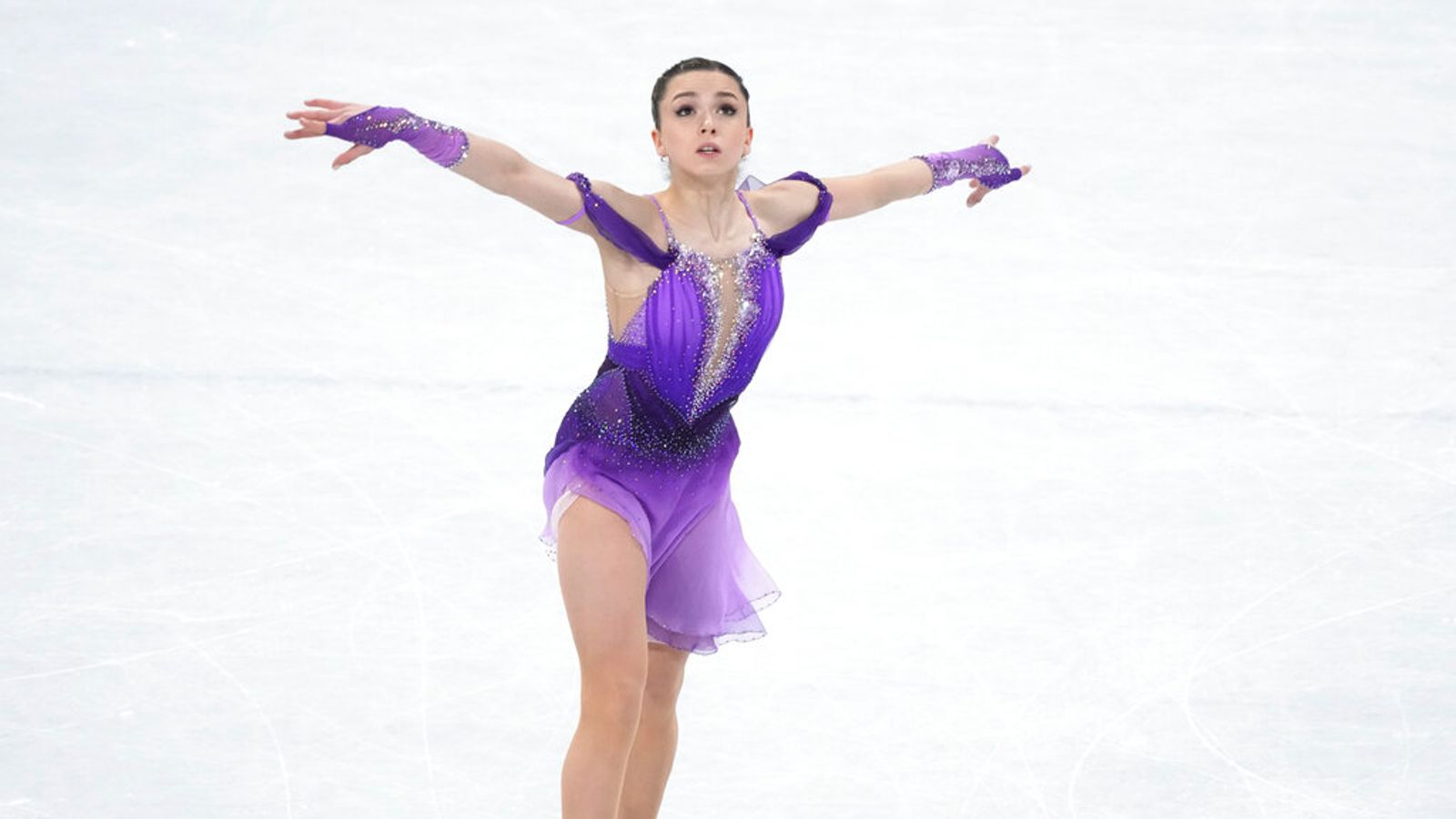Russia has been plunged into a fresh doping scandal after a teenage figure skater who made history during her first Olympic appearance tested positive for a banned substance.
Kamila Valieva, 15, made the record books at the Beijing Winter Games on 7 February when she became the first woman ever to land a quadruple jump at the Olympics.
Her standout performance helped the Russian Olympic Committee win the team event.
Read more – Hold your head up: Russia backs Valieva
But the following day the medal ceremony was postponed when it emerged she had tested positive for an illegal drug.
Russia is already serving an international ban for doping cover-ups at the Sochi Games in 2014.
Here Sky News looks at the doping scandal and what it could be mean for the teenage athlete.
2022 Beijing Olympics: Kamila Valieva facing expulsion after positive drug test confirmed for Russian figure skater
Beijing Olympics: Russian figure skater Kamila Valieva failed drug test – and IOC will appeal against lifting of ban
Kamila Valieva: Russian star practices as usual at Beijing Olympics despite reports of positive drug test
Who is Kamila Valieva?
Kamila Valieva, from Kazan, southwest Russia, began skating at the age of just three.
At six she moved to Moscow to train and made her international junior debut seven years later at the Junior Grand Prix competition in Courchevel, France, where she won gold.
Her senior debut came less than a year ago at the 2021 CS Finlandia competition in October. There she set two world records – for her overall score and total points.
She went on to win a world-level event in Sochi in November and became national champion following her performance at the 2022 Russian Figure Skating Championships in St Petersburg on 24 and 25 December.
When did she fail her drugs test?
During the competition in St Petersburg, Valieva was drug tested by the Russian Anti-Doping Agency (RUSADA) on Christmas Day, the International Testing Agency (ITA) has now confirmed.
She then won at the European skating championships in Tallinn, Estonia in January, where the International Skating Union (ISU) should have tested competitors – particularly those who won medals.
But it wasn’t until 8 February that the World Anti-Doping Agency (WADA) confirmed that its lab in Stockholm had detected the banned substance Trimetazidine in Valieva’s sample.
This was a day after she and her Russian teammates won the team event in Beijing, which meant the medal ceremony, due to take place that day, was postponed.
As the positive sample was collected by RUSADA before the official Olympic period began on 27 January, the Russian authority issued Valieva with an automatic suspension.
Valieva appealed RUSADA’s decision at a hearing on 9 February, which was granted, enabling her to continue to train and compete at the Winter Games.
But the International Olympic Committee (IOC) is exercising its right to appeal the RUSADA decision, which will be heard before she is next due to compete – at the women’s single event – on 15 February.
She was seen training as normal on 11 February.
What is trimetazidine?
Trimetazidine is a metabolic drug used to treat angina and chest pain caused by lack of blood and oxygen supply to the heart.
It can also be used to reduce symptoms of vertigo, tinnitus and blurred vision.
Sometimes referred to as TMZ, it works by increasing blood flow from the heart to the rest of the body.
Increased blood flow to the muscles makes them perform better and improves endurance, which is why the substance is banned by WADA.
Under WADA regulations it falls under “hormone and metabolic modulators”.
Has it been used in sport before?
The most famous case of trimetazidine being used as a performance-enhancing drug involved the Chinese swimmer Sun Yang.
The three-time Olympic champion was banned for three years in 2014 after testing positive for the drug.
He was later punished for failing to co-operate with sample collectors at home in China.
Russian bobsledder Nadezhda Sergeeva was disqualified from the 2018 Pyeongchang Winter Olympics after testing positive for TMZ. She then served an eight-month ban.
Traditional doping is relatively uncommon in figure skating as having a larger muscle mass is seen as a disadvantage.
But skaters have been caught trying to control their weight with diuretics, which are also banned due to their ability to mask steroids and other performance-enhancing drugs.
What happens now?
The IOC’s appeal will be led by the ITA and heard at the Court of Arbitration for Sport.
An outcome must have been reached by 15 February, when Valieva is next due to compete in Beijing.
Her age could mean she is offered some leniency as the World Anti-Doping Code defines athletes under 16 as “protected people”.
This means the judge may rule that because she is so young she could not have acted of her own volition and therefore her team and coaches are more to blame.
Her “protected person” status means an investigation of her “athlete support personnel” will form part of the case.
If she is proven guilty of doping she faces a maximum two-year ban.
What could it mean for Russia?
Russia is already serving an international ban for widespread state-sponsored doping during the Winter Games it hosted in Sochi in 2014.
As a result Russian athletes had to compete without their flag or national anthem at the Tokyo 2020 Games last year under the name ‘Russian Olympic Committee’ – and at the Winter Games in Beijing this month.
Further doping allegations do not bode well for Russia’s international sporting reputation and could see its current ban extended.






















